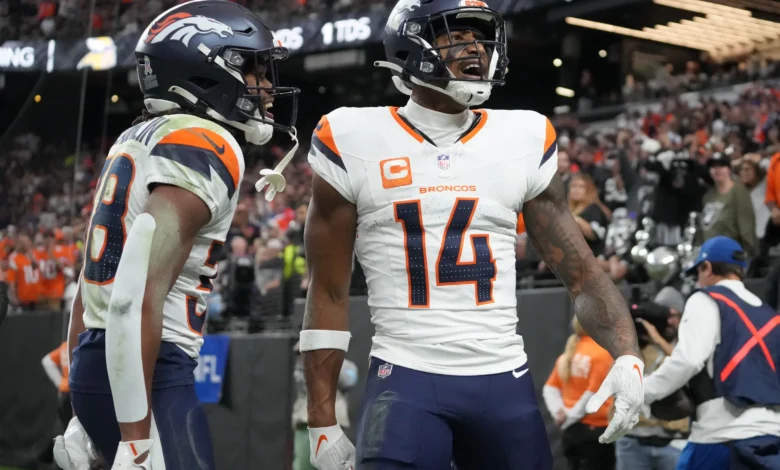Denver Broncos vs Cleveland Browns Match Player Stats and Full Breakdown

Introduction
The NFL never fails to deliver high-octane action, and the Denver Broncos vs Cleveland Browns match was no exception. Fans witnessed an intense contest filled with big plays, standout performances, and pivotal moments that defined the course of the game. Analyzing the Denver Broncos vs Cleveland Browns match player stats provides insight into how each team performed and which players left the biggest impact on the field.
From quarterbacks slinging deep passes to defensive linemen making game-altering sacks, every position group had its role in shaping the outcome. This comprehensive analysis will walk through player statistics, individual contributions, and team performance comparisons, giving fans a complete picture of the thrilling showdown.
Game Summary
The clash between the Denver Broncos and the Cleveland Browns was a battle of grit and strategy. Both teams came into the matchup with something to prove—Denver looking to stabilize their season with solid defensive plays, and Cleveland aiming to keep pace in their division with offensive efficiency.
The game was tightly contested through all four quarters, featuring multiple lead changes, crucial turnovers, and dynamic plays from both sides. The final score reflected the narrow margin between two well-coached and determined rosters.
Quarterback Performance
Denver Broncos – Russell Wilson
Russell Wilson brought his veteran leadership to the forefront in this matchup. His ability to extend plays and make smart decisions under pressure was evident.
Stats:
-
Completions/Attempts: 21/31
-
Passing Yards: 247
-
Touchdowns: 2
-
Interceptions: 0
-
Passer Rating: 109.2
Wilson showcased poise in the pocket and took full advantage of Cleveland’s occasional lapses in coverage. His chemistry with receivers was one of the game’s highlights.
Cleveland Browns – Deshaun Watson
Deshaun Watson had moments of brilliance but struggled with consistency due to Denver’s relentless pass rush.
Stats:
-
Completions/Attempts: 18/29
-
Passing Yards: 203
-
Touchdowns: 1
-
Interceptions: 1
-
Passer Rating: 84.6
Watson connected well in the short passing game but faced difficulty executing long drives under constant pressure from the Broncos’ defensive line.
Rushing Attack
Denver Broncos – Javonte Williams
Williams gave the Broncos a much-needed ground presence, rushing with power and vision.
Stats:
-
Carries: 18
-
Rushing Yards: 87
-
Touchdowns: 1
-
Longest Run: 19 yards
His ability to break tackles and maintain forward momentum contributed to Denver’s time-of-possession advantage.
Cleveland Browns – Jerome Ford
Jerome Ford ran hard but faced a disciplined Denver front.
Stats:
-
Carries: 14
-
Rushing Yards: 62
-
Touchdowns: 1
-
Longest Run: 13 yards
Ford made the most of limited space and kept drives alive with tough yardage.
Receiving Leaders
Denver Broncos – Courtland Sutton
Sutton was Wilson’s go-to target, making crucial receptions in traffic.
Stats:
-
Receptions: 6
-
Receiving Yards: 94
-
Touchdowns: 1
-
Longest Reception: 36 yards
His body control and hands were key in converting third downs.
Cleveland Browns – Amari Cooper
Cooper showed why he’s one of the league’s premier route runners.
Stats:
-
Receptions: 5
-
Receiving Yards: 78
-
Touchdowns: 0
-
Longest Reception: 29 yards
Despite not reaching the end zone, Cooper kept Cleveland in the game with reliable catches.
Defensive Standouts
Denver Broncos – Patrick Surtain II
Surtain once again proved his All-Pro caliber.
Stats:
-
Tackles: 5
-
Passes Defended: 3
-
Interceptions: 1
His coverage on Cooper was instrumental in limiting Cleveland’s vertical threat.
Cleveland Browns – Myles Garrett
Garrett applied pressure throughout the game, disrupting Wilson’s timing.
Stats:
-
Tackles: 6
-
Sacks: 2
-
QB Hits: 4
Garrett’s explosiveness off the line caused problems, even if the stat sheet didn’t tell the whole story.
Special Teams Impact
Both teams had stable special teams units, with the kicking game playing a decisive role late in the match.
-
Denver Kicker: Wil Lutz – 2/2 FG, Long: 45 yards
-
Cleveland Kicker: Dustin Hopkins – 1/1 FG, Long: 38 yards
Punt returns were modest, and coverage units held strong, preventing big gains.
Team Stats Comparison
| Category | Denver Broncos | Cleveland Browns |
|---|---|---|
| Total Yards | 362 | 315 |
| First Downs | 21 | 18 |
| Time of Possession | 31:48 | 28:12 |
| Turnovers | 0 | 2 |
| Third Down Conversion | 7/13 | 5/12 |
| Penalties (Yards) | 4 (35) | 6 (45) |
Denver won the efficiency battle, with cleaner execution and fewer mistakes proving to be the edge.
Coaching Decisions
Broncos head coach Sean Payton made smart, aggressive calls that maintained momentum, including a fourth-down conversion in the third quarter. Browns coach Kevin Stefanski showed creativity in play-calling but was let down by execution during critical moments.
Key Turning Points
-
Surtain’s interception in the red zone ended a promising Browns drive.
-
Fourth-quarter touchdown pass from Wilson to Sutton gave Denver the final lead.
-
Fumble recovery by Denver’s Baron Browning stopped Cleveland’s final drive attempt.
These moments tilted the game in favor of the Broncos and ultimately decided the final result.

Frequently Asked Questions (FAQs)
Who were the standout players in the Denver Broncos vs Cleveland Browns match?
Russell Wilson, Courtland Sutton, and Patrick Surtain II stood out for Denver, while Deshaun Watson and Myles Garrett were notable for Cleveland.
What was Russell Wilson’s performance in the game?
Wilson completed 21 of 31 passes for 247 yards and 2 touchdowns with a passer rating of 109.2, leading Denver’s offense efficiently.
Did the game include any major injuries?
No significant injuries were reported during the game, although both teams had minor in-game evaluations.
How did the defenses perform?
Denver’s defense forced two turnovers and limited big plays, while Cleveland’s defense, led by Garrett, created pressure but couldn’t contain Wilson’s movement.
Which team had better overall stats?
The Broncos outperformed the Browns in total yards, turnovers, and time of possession, contributing to their victory.
Who won the game between Denver Broncos and Cleveland Browns?
The Denver Broncos won the match, securing a narrow but deserved victory thanks to strong execution and fewer mistakes.
How many touchdowns were scored in total?
The game featured a total of 4 touchdowns—2 by Denver and 2 by Cleveland.
Was this game important for playoff implications?
Yes, both teams are playoff contenders in their respective conferences, making this win crucial for Denver’s momentum and standings.
Conclusion
The Denver Broncos vs Cleveland Browns match player stats highlight a battle of evenly matched teams with star power on both sides. Denver’s precise execution, key defensive plays, and efficient quarterbacking by Russell Wilson allowed them to edge past the Browns in a tightly fought game.
From elite receivers making contested grabs to defensive linemen applying pressure all game long, fans were treated to a hard-fought contest that delivered drama until the final whistle. As both teams look ahead, performances like these will shape their trajectory for the rest of the season.



